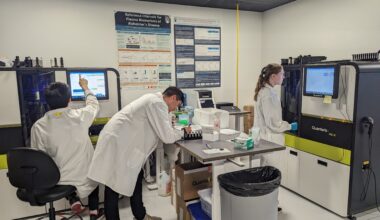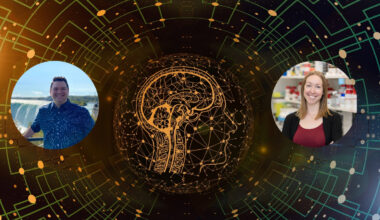Karina Thiessen is a PhD student in Dr. Christian Schütz’s lab. We caught up with Karina to learn more about her research and future plans.
What inspired you to pursue a degree in Neuroscience?
I’ve had a long-standing interest in substance use and mental health disorders. I wanted to explore how the intersections between biological mechanisms and psychological states are involved in these disorders and how we can apply this knowledge to improve treatments. About two years ago, I had the opportunity to work as a research coordinator with my current supervisor, Dr. Christian Schütz. His focus on clinically oriented and translational research on concurrent substance use and mental health disorders was a great fit for my interests, inspiring me to pursue graduate studies in this area. Neuroscience is a truly interdisciplinary field and I love the integration of different methodologies and perspectives to better understand psychiatric disorders.
What is the main focus of your research?
Broadly, the focus of my research is risk factors and treatment of substance use and mental health disorders. More specifically, I am examining associations between substance use and psychoneuroimmunological mechanisms to evaluate how these factors might predict risk and treatment for substance use and mental health disorders.
One study I am currently working on is a human drug administration trial to assess the effects of cannabinoids, the chemical compounds found within cannabis, in individuals with heavy drinking and frequent cannabis use. We are applying techniques such as functional Magnetic Resonance Imaging (fMRI), immunoassays, cognitive testing, and subjective reports to experimentally evaluate the effects of tetrahydrocannabinol (THC), combined with differing amounts of cannabidiol (CBD), on stress response and impulsivity.
What is your favourite thing about the Graduate Program in Neuroscience (GPN) at UBC?
It’s hard to pick one favourite thing! One of the best things about the GPN is the community and mentorship for students. Trainees can attend events such as Empower Hours and research colloquia that facilitate personal wellbeing and academic growth. Peers and faculty are wonderfully supportive.
The GPN is also a testament to the interdisciplinary nature of neuroscience, and it’s exciting to interact with researchers from a range of academic backgrounds at UBC. The setting of UBC in the beautiful city of Vancouver is a nice bonus too!
What are your plans or career goals after completing your degree?
After completing my PhD, I plan to work as a postdoctoral fellow and pursue a faculty position at a university. My long-term aim is to be a translational researcher studying the neuroscience of mental health and substance use disorders.


